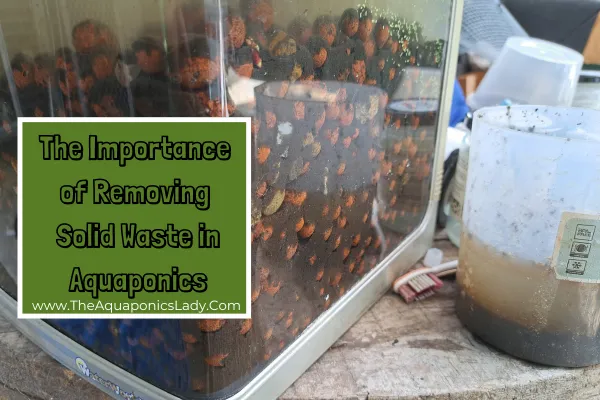
The Importance of Removing Solid Waste in Aquaponics
Aquaponics Systems Waste Management: Removing Solid Fish Waste
In the early days of aquaponics, it was common practice to leave uneaten fish food and fish waste in the system.
Unfortunately, this approach led to significant water quality issues, including dangerous spikes in ammonia and nitrite levels.
These spikes were unpredictable and could harm both fish and plants.
Today, we know better. Removing solid waste from your aquaponics system is essential for maintaining a healthy and balanced ecosystem.
The Old Approach: Adding Worms
Back then, one solution was to add worms to the system. The idea was that worms would help break down the solid waste.
However, this method was far from effective because worms produce their own solid waste. This would accumulate in the grow bed, meaning more solid waste must be removed.
Plus, you would need an impractical number of worms to manage a heavily stocked system—hundreds of thousands.
This method didn't remove the problem; it just added another layer of complexity.

The Modern Solution: Mechanical Filters
Today, we use mechanical filters to remove solid waste from the system before it reaches the grow bed.
A mechanical filter is a crucial component of any aquaponics setup. It helps maintain water quality and prevents the build-up of harmful substances.
For small aquaponics systems, a simple "solids trap" can be used. This needs to be cleaned weekly but effectively traps the solid waste.
As the aquaponics system size increases, so does the size of the mechanical filter required.
No matter the size, the principle remains the same: water and waste enter the filter, clean water exits, and the waste is left behind until it is manually removed.
Types of Mechanical Filters
Mechanical filters come in various shapes and sizes, but their function is same no matter the shape or size. They catch solid waste and prevent it from circulating through the system. Some common types include:
Buckets or Pales: Affordable and straightforward, these filters are best for small aquaponics systems.
Small Drums: Compact and efficient, ideal for managing waste in medium-sized setups.
Radial Flow Filters: Excellent for larger systems, these filters use gravity to separate solids effectively.
Solids Separators: Designed for heavy-duty use, they handle high waste loads in large or commercial systems.
Maintaining Your Aquaponics System Through Regular Solid Waste Removal
Regular cleaning of the mechanical filter is not just a task; it's a responsibility. It's essential to keep your system running smoothly and ensure the health of your fish and plants. Neglecting this step can lead to the same water quality issues that plagued early aquaponics enthusiasts.
By removing solid waste efficiently, you ensure healthy fish and healthy plants.
I've known people who don't have a mechanical filter and don't remove their solid waste. Instead, after each growing season (once or twice a year at most), they have to manually remove all the gravel from the grow bed, clean it, and put it back.
Or, you can install a simple mechanical filter!
Here are some videos for simple, easy and cost effective mechanical filters:
Find out the surprising secret to simplifying solid waste in Aquaponics (Hint: Solids Trap).
Understand what the difference between a Radial Flow Filter (RFF) and Solids Separator (SS) is in Aquaponics.
Reliable Aquaponics Management Starts with Clean Systems
Removing solid waste is a critical aspect of maintaining a healthy aquaponics system. Modern mechanical filters make this task easier and more efficient, ensuring that your fish and plants thrive. Remember, a clean aquaponics system is a healthy one.
Understand more about Aquaponics as a whole with this glossary of common aquaponics terms.
Learn More About Aquaponics
Check out the COURSES page to learn how you can get started with aquaponics now. Click HERE.
Want to get your Eyes and Hands on the FREE Online Aquaponics Essentials Course?
This is a great free resource to really understand how aquaponics is a sustainable ecosystem that will grow your organic food is a productive way.
You learn how all the 'parts' make up the 'whole', and helps to give you the foundations of understanding aquaponics.
Sign up HERE
Want to help out and Feed my Fish?? (They don't drink coffee)
Check out My YouTube Channel 'Candy The Aquaponics Lady'
Aquaponics is an ecosystem, and with anything it takes time to learn how it works. So, sit back and binge watch my 'how to' playlist and the 'Water Quality Made Simple' Playlist, and learn the next steps in your aquaponics system as you create the ecosystem.

Candy Alexander is a dedicated aquaponics enthusiast with a wealth of formal training in aquaculture. Over the past 15 years, Candy has been deeply immersed in both commercial and backyard aquaponics, honing her skills and expertise in this sustainable farming method.
Candy's passion lies in making aquaponics accessible to everyone. With a mission to simplify aquaponics, she believes that anyone can embark on this sustainable journey.
She encourages those new to aquaponics to "kick the tires" without a significant financial investment. Her guidance focuses on helping people start their aquaponics journey with small-scale systems, ensuring a low barrier to entry for newcomers.
Candy shares practical tips, step-by-step guides, and personal stories to inspire and guide readers on their aquaponics adventure. Whether you're a seasoned farmer or a curious beginner, Candy Alexander is your go-to source for simplifying aquaponics and fostering a sustainable gardening experience.